How we deal with data, why it matters and why we’ve really got to get this right, right now
- Written by
- Ken Burnett
- Added
- February 09, 2017
Book review
Data Driven Nonprofits, Saltire Press, UK, 2016
by Steve MacLaughlin
Reviewed for SOFII by Ken Burnett
This book review started as a blog. I’d finally got around to reading Data Driven Nonprofits by Blackbaud’s VP of data and analytics, Steve MacLaughlin (Saltire Press, UK, 2016). He of course is someone who knows more than most about data and how to use it, particularly to advance the causes of charities. Just a few pages in and my head was swimming with shocks and revelations. Then I realised something of such importance I felt compelled to write about it.
I’d bought my e-copy of Steve’s book a while back, already knowing I should get to it without delay. Over many years I’ve benefited from friendship with Steve’s colleague Chuck Longfield, which alone should have told me I’d learn heaps from it. Plus, as Steve has the word ‘laugh’ buried within his name I should also have known I’d enjoy it too.

But the first thing that struck me when I finally got to the book was that even after 40 years it’s still possible to learn something remarkable about our profession. I was already aware of those early pioneers from the dawn of fundraising in the 1900s Charles Sumner Ward and Lyman Pierce of YMCA and how, long before the invention of computers, databases and the internet, they used the new concepts and best technologies of their day superbly to shape the emerging fundraising profession and raise $billions in the process. What I didn’t know was just how poorly and ineptly modern fundraisers are struggling to follow in their footsteps – despite having at their fingertips, and at minisculey-low comparable cost, shed loads of power and potential in today’s data management and analytic technology. Which begs the question: just what wonders could those two visionaries, Ward and Pierce, have done if they’d had access to the tools we have now, yet so under-use?

What’s shocked me most – unconnected to Steve’s book – is the realisation that access to and control of data is becoming so much more restricted now and the signs are that this trend will be exceptionally damaging for UK charities. So, because of scandals around poor fundraising practices and the perceptions government and legislators have of fundraisers’ lack of integrity, we may be about to lose even the chance of putting right many of the wrongs that Steve highlights, just as he’s pointing out to us what we have to do.
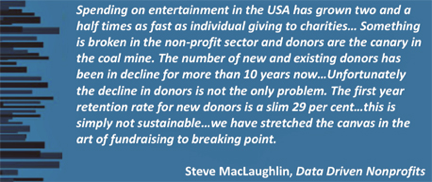
Like it or not, issues of respect, consent, transparency, ownership of data and permissions to communicate are now being scrutinised eagerly by those who would protect the public from predatory fundraisers. The regulators of course are concerned about unacceptable practices involving abuse, high pressure, acquisitiveness and our sector’s seemingly insatiable quest for ever-more donations at any cost. Those that govern us view our sector through critical, unforgiving eyes. They are eyes outside our sector and their owners are not inclined to make allowances or accord charities special privileges. It matters little that the brains behind those eyes are not as well informed as they might be about how fundraising works and why it matters to donors, causes and society at large that fundraising should flourish. The end will sadly be the same.
So here in Data Driven Nonprofits we have fundraising’s modern-day equivalent of Moses in the wilderness telling us that we are failing our beneficiaries, our donors, our colleagues and ourselves because as a sector, almost since fundraising began, we’ve not invested properly or wisely in data and analytics and we don’t have a joined-up strategy for implementing available technologies effectively. This is a stinging indictment that ought to embarrass us into action. Then, from his viewpoint – perhaps the best possible vantage point in our entire industry –Steve sets out, step by step, precisely what we should do to change that.
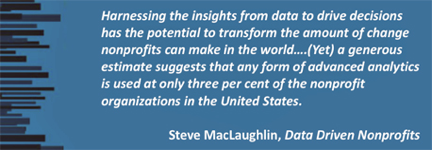
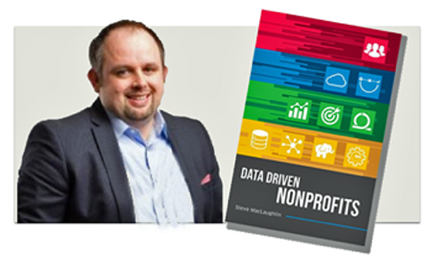
Hooray to that! But then…why am I left wondering whether there’s anyone, anywhere in our sector, capable of taking this gift to fundraising’s future and acting upon it to make our donors’ experiences better, as well as our organisations fitter and finer for all who work in and depend upon them? And capable of making redundant Steve’s opening observation, in the first quote above?
That our sector’s grip on its best tools is so weak certainly isn’t for lack of trying on the part of Steve MacLaughlin and his likes. In Data Driven Nonprofits he’s taken us to the mountaintop and spread before us where we could and should aspire to be. And how we can get there too. Later chapters delve deeply into what you need to know about data, how you can use it to contact the right people in the right way at the right time about what they think are the right things, for them. He shows you the difference between data and opinions, where to find value in the data you already have, how to work out what data matters most for you, how you can avoid ‘myths-as-best-practices’ and how to use data better to solve all the issues around donor comfort and satisfaction that you can think of. On the way, he helps you check whether or not your data is ‘healthy’ and shows that sometimes the biggest advances are found in the simplest things. And of course he tackles the big stuff too.
At the end of it you’ll know whether yours is a data-driven nonprofit, or not.
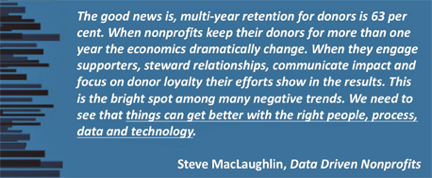
The underlining in the quote above is mine. The aspiration could come straight out of the founding document of the Commission on the Donor Experience. It’s unarguable. It always comes back to this: most of all, we need the right people and we need to equip them properly with the best there is so they can do their vital jobs just as well as possible. Our donors and beneficiaries deserve nothing less.
So, is there any entrepreneurial spirit, any competent leader out there prepared to pick this up and lead our people to the promised land? Steve is certainly right when he says of nonprofit leadership that, in recent years, ‘we have stretched the canvas in the art of fundraising to breaking point’.
It’s long past time that we changed that. That we have not yet done so is a visible failure of that leadership. Of course, we also have to be integrity driven, as well as data driven – what a difference they’ll make, together! So now is the time for all good men and women to step up. And be the change our sector needs to see.
© Ken Burnett 2017
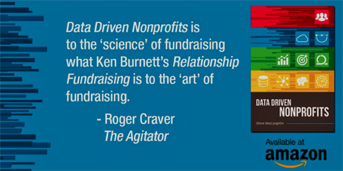
Shameless, I know, but I couldn’t leave out this last quote about DDNP because I love it so. Hugely honoured of course by this from internationally respected super-campaigner Roger Craver of The Agitator and now I’ve read Steve’s book, I’m overawed. But Relationship Fundraising first appeared 25 years ago and though widely credited with changing the theory, its direct influence on the donor experience has been disastrously inadequate. Data Driven Nonprofits appeared last year. Surely fundraisers and their leaders will act on its obvious wisdom now? In fact, why not buy both books together and make up for lost time?
With thanks to Steve MacLaughlin, vice president, data and analytics, Blackbaud Inc, for his great guest contributions.
You can find Steve's book on Amazon.com and Amazon.co.uk.


















